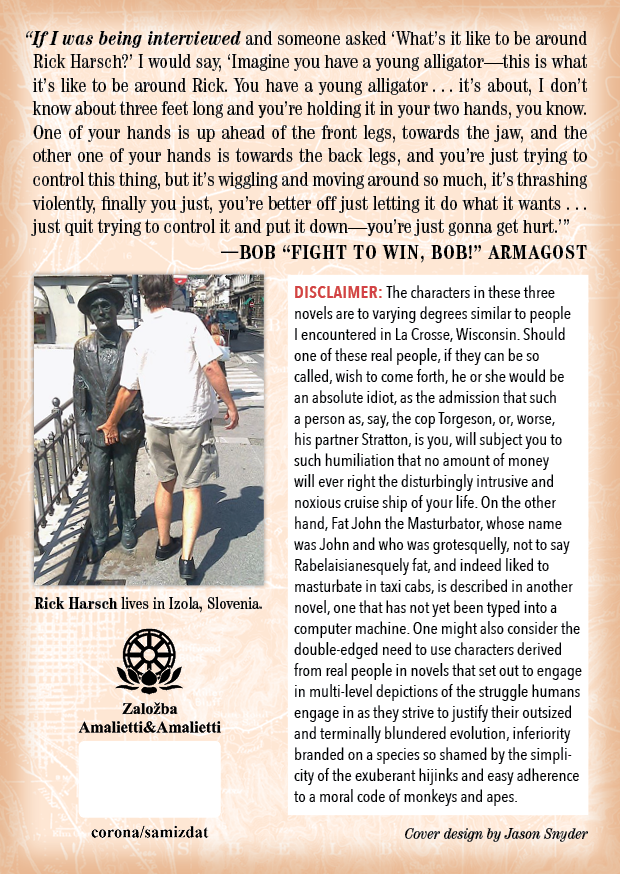



by Rick Harsch, chief editor
corona/samizdat is an independent imprint of the Slovenian press Amalietti&Amalietti, which has published several of my books in Slovenian translation, including Skulls of Istria (goodreads: https://www.goodreads.com/book/show/40731160-skulls-of-istria?ac=1&from_search=true&qid=9D4XOTJ0oE&rank=1). My most accomplished large work of fiction, The Manifold Destiny of Eddie Vegas (here given a magnificent review by Chris Via: https://www.youtube.com/watch?v=ngVSNv69LM8&t=36s), along with my ‘standard anti-fascist baseball memoir travelogue’ Walk Like a Duck, a Season of Little League Baseball in Italy, were to be published by Riverboat Books. The fifth date given for the release of these two books was May 26 of this year, 2020. By mid-April, when an advance copy had been sold to some number of people, and two reviews were planned, Peter Damian Bellis, the publisher of Riverboat Books, told me he had only 16 advance copies of Eddie Vegas to sell on that date, would have no updated copies ready, and by the way, had only sent three copies of Duck to anyone seeking a review or publicity of some kind, even though he had had the final copy since December. I could not allow him to sell any but the best copy for two very important reasons: 1) I had a very good blurb on the new cover written by the great critic Steven Moore; and, 2) He had left the table of contents out of the advance review copy. The latter may seem a small point, but instead the table of contents is a Rabelaisian list, a sneaky list in a books that has several Rabelaisian lists that lead up to a list that is unfortunately not Rabelaisian–but I won’t divulge that secret here. Look at the tabel of contents:


One may easily imagine Rabelais writing, ‘These were the chapters of his book.’ As designed, the chapters that are quite relevant to their contents do read like something Rabelais would scribble while drunk.
Here is what Steven Moore scribbled, whether drunk or not, I have no idea:

Pardon me if I don’t reduce the size. For all I know that may be one of few highlights in my writing career.
So you see why I had to get the hell away from Bellis and Riverboat. There is a very strong urge I am resisting to go on about his malfeasance, but more important is what I chose to do. I pulled my books from his press–unbeknownst to Bellis I had never signed the contract he had sent me, as I had poor experiences with him the year before when he published, but did little else with Skulls of Istria (cover being designed as I write, and due for corona/samizdat print late this week or early next). I borrowed money that I used to print 100 copies of Eddie Vegas and 25 of Ducks, as the review I posted above was bound to attract buyers, and I wanted them to get the real book, and I was sure 16 copies would not be enough (before the review I sold 16 or 17/after the review I have thus far sold 20 more. Here I suppose I should explain the title of the press. Corona is self-explanatory, though it also suggests an effort to keep prices down (my copy of The Manifold Destiny of Eddie Vegas is 20 dollars or Euros, while the advance copy of it was sold for 27 by Riverboat). Samizdat is used for the necessity to write in the books that they are not for sale in the United States, as I still hope to find a publisher for Eddie Vegas and Ducks there. So anyone in the US buying the book must smuggle it in. Of course, they do so by contacting me, just on the far side of the ironed curtain, at rick.harsch@gmail.com, send money to Paypal, and have the book sent to them at their safehouses.
I could not have managed any of this without Peter Amalietti, the chief of Amalietti&Amalietti. In fact, I spoke with him the Sunday after I broke with Riverboat, and had the printed books at home with me by Friday. Five days!
And I was very impressed with the printers, Primitus of Ljubljana, a small family operation that had actually printed two of my books in translation previously. I had always, as a young writer, imagined pocket book editions of my novels, but times have changed the book business even when it comes to the size of books. Pocket books are rare. I considered having Skulls of Istria made into a pocket book, but then I thought of the plight of David Vardeman, who was supposed to be printed by Riverboat, a book including the short novel An Angel of Sodom along with 13 more stories. Vardeman wanted nothing to do with Bellis and Riverboat, and as far as he knew, Bellis had forgotten him. I realized it was in my power to use corona/samizdat to finally get this genius into print. And so it has come to pass:

That photo shows the actual size of the book. This is a pocket book that really does fit in pockets. It slides easily in and out of the front pocket of my jeans. Not only that, it is 416 pages of deeply strange and profound human hijinks that have me laughing throughout. It’s difficult to open to a page that does not have something on it that makes me laugh. It’s not a happy book, but Vardeman is a master at re-arranging sorrow into sqaums of laughter that flit uneasily to uncertain depths.
Given the extraordinary cover, a detail of a painting by the Ukrainian Eduard Belsky, I felt it important to follow with a great cover when I decided to print my own, long out of print The Driftless Trilogy, and so made an arrangement with the best book cover man in the business, Jason Snyder of Staten Island, who came up with the cover you see above. Here is the back cover of that trilogy:

You may notice that the blurb is of the author and not his works, and the description of the book is provided through a disclaimer. You might even notice me giving the scrote of the statuesque James Joyce a squeeze in Trieste. Rather than suffer the Strings and sparrows of publishing fortune, I decided to do my own book my own way. You may find one story of the blurber on the front cover, the Aussie James Adler here on my blog and another somewhere at the goodreads site. Even I am confused about the Adler tale by now.
The biggest problem with this press is the fact that I am not and never will be a real chief editor or publisher. I only arrange. I facilitate. George Salis will be selling his ‘out of the US’ edition of Sea Above, Sun Below through corona/samizdat. His book will have a different cover (from his Riverboat one–good luck to you, George) and will be cheaper from c/s. The main thing, though, is that his novel is a fine piece of writing, as you will find here at goodreads: https://www.goodreads.com/book/show/50920877-sea-above-sun-below?ac=1&from_search=true&qid=Qwz9gW3gNb&rank=3
The next, fifth pocket book, will be by Bori Praper, Cynicism Management.
After that, the future remains uncertain. If any money is available, we may publish Larry Riley’s translation of the second half of Roberto Arlt’s The Flamethrowers, a bit of literary history that Riverboat had no idea how to disseminate. Arlt wrote The Seven Madmen, the first half of his novel, and that was translated and published in the US twice, but only after nearly 90 years did Riley’s seminal translation of The Flamethrowers appear in English.
corona/samizdat has no great ambitions, but those it has are diametrically opposed to the standard ambitions of almost all presses I have come to know something about. There is to be absolutely no attempt to make a profit. Once printing and author copy postage are paid, 50% of all sales go to authors, 25 to me, and 25 to Amalietti and Amalietti. My end will be funneled back into the press. The goal of each book is to simply publish something that deserves to be published. This is easily accomplished, as the removal of the profit shadow allows books to flourish. I, personally, don’t give a rat’s ass about typos or anything normally taken up by an editor. If a writer we come across has a book ready to print, tells me it is ready, we will print it if we have the money. We will not take submission from the general public. This press exists to get some writers into print, to keep some in print, return some to print. There is no reason this model should not be copied elsewhere. Bring the pocket book back. We can afford to print them and people can more easily afford to buy them. Don’t submit books to me or us: find your group of literary people and create a press.
incidentally, all of the books mentioned in this first communique from corona/samizdat should be published by the end of July at the latest.
you have my word on all of this,
Rick Harsch










